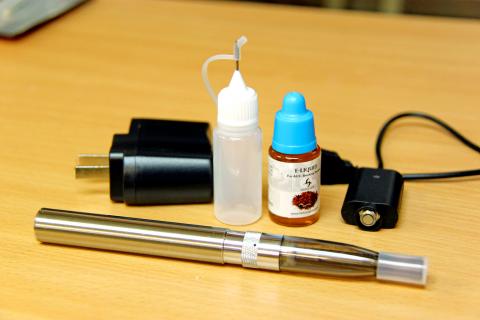A number of anti-smoking advocates yesterday urged the government to regulate electronic cigarettes as a tobacco product rather than a controlled drug to address rampant illegal sales of the device.
The call came one day after the WHO report called for tighter regulation of e-cigarettes, including their use in public places and outlawing tactics to lure young users.
“Electronic cigarettes are a type of cigarette, but some manufacturers market the devices as a healthier alternative to conventional tobacco, which has misled young people into thinking that it is okay to use the product,” Lin Ching-li (林清麗), director of the John Tung Foundation, the nation’s most prominent anti-smoking group, said in a telephone interview.

Photo: EPA
The government categorizes e-cigarettes containing nicotine as a regulated drug subject to the Pharmaceutical Affairs Act (藥事法). Due to the stringent requirements for getting a permit to manufacture or sell a drug, no e-cigarettes can be sold in Taiwan.
However, the act only targets manufacturers, importers and sellers of the device, not consumers. The illegal manufacture, import or sale of e-cigarettes is punishable by a maximum prison term of 10 years and a fine not exceeding NT$10 million (US$330,000).
Nicotine-free e-cigarettes are covered by the Tobacco Hazards Prevention Act (菸害防制法), which prohibits the unlicensed manufacture, import and sale of any “candies, snacks, toys or any other object shaped like cigarettes.” Violators could face fines ranging from NT$10,000 to NT$50,000.
Lin said categorizing e-cigarettes as a regulated drug has only prevented them from entering the country legally, because people can still purchase them online, on the street or in night markets.
Foundation chief executive officer Yao Shi-yuan (姚思遠) said the group has received 939 complaints about illegal e-cigarettes over the past five years and he urged the government to stop turning a blind eye to the problem.
“Products that contain nicotine that are not designed for medical purposes should be regulated under the same law as tobacco products. That is the only way to prevent people from selling e-cigarettes, marketing them online, or using them indoors or in public places,” Yao said.
Since the manufacturers would also be required to comply with the packaging and labeling regulations covering conventional cigarettes, people would stop thinking that e-cigarettes are safe to use, he said.
Consumers’ Foundation chairman Mark Chang (張智剛) said categorizing e-cigarettes as a tobacco product is the only way to address the problem.
Wu Ming-mei (吳明美), section head of the Food and Drug Administration’s Northern Center, said the listing of e-cigarettes as a regulated drug in 2009 was meant to prevent them from entering the country.
According to the New York Times, the WHO report expressed “grave concern” about the growing role of the tobacco industry in the e-cigarette market and said the devices should be banned from indoor use “until exhaled vapor is proven to be not harmful to bystanders.”
The report also called for regulation to ensure the products contain a standard dose of nicotine, bans on sales to minors and that fruity, candy-type flavorings be prohibited, the Times said.
Additional reporting by staff writer

Taipei, New Taipei City, Keelung and Taoyuan would issue a decision at 8pm on whether to cancel work and school tomorrow due to forecasted heavy rain, Keelung Mayor Hsieh Kuo-liang (謝國樑) said today. Hsieh told reporters that absent some pressing reason, the four northern cities would announce the decision jointly at 8pm. Keelung is expected to receive between 300mm and 490mm of rain in the period from 2pm today through 2pm tomorrow, Central Weather Administration data showed. Keelung City Government regulations stipulate that school and work can be canceled if rain totals in mountainous or low-elevation areas are forecast to exceed 350mm in

EVA Airways president Sun Chia-ming (孫嘉明) and other senior executives yesterday bowed in apology over the death of a flight attendant, saying the company has begun improving its health-reporting, review and work coordination mechanisms. “We promise to handle this matter with the utmost responsibility to ensure safer and healthier working conditions for all EVA Air employees,” Sun said. The flight attendant, a woman surnamed Sun (孫), died on Friday last week of undisclosed causes shortly after returning from a work assignment in Milan, Italy, the airline said. Chinese-language media reported that the woman fell ill working on a Taipei-to-Milan flight on Sept. 22

COUNTERMEASURE: Taiwan was to implement controls for 47 tech products bound for South Africa after the latter downgraded and renamed Taipei’s ‘de facto’ offices The Ministry of Foreign Affairs is still reviewing a new agreement proposed by the South African government last month to regulate the status of reciprocal representative offices, Minister of Foreign Affairs Lin Chia-lung (林佳龍) said yesterday. Asked about the latest developments in a year-long controversy over Taiwan’s de facto representative office in South Africa, Lin during a legislative session said that the ministry was consulting with legal experts on the proposed new agreement. While the new proposal offers Taiwan greater flexibility, the ministry does not find it acceptable, Lin said without elaborating. The ministry is still open to resuming retaliatory measures against South

1.4nm WAFERS: While TSMC is gearing up to expand its overseas production, it would also continue to invest in Taiwan, company chairman and CEO C.C. Wei said Taiwan Semiconductor Manufacturing Co (TSMC) has applied for permission to construct a new plant in the Central Taiwan Science Park (中部科學園區), which it would use for the production of new high-speed wafers, the National Science and Technology Council said yesterday. The council, which supervises three major science parks in Taiwan, confirmed that the Central Taiwan Science Park Bureau had received an application on Friday from TSMC, the world’s largest contract chipmaker, to commence work on the new A14 fab. A14 technology, a 1.4 nanometer (nm) process, is designed to drive artificial intelligence transformation by enabling faster computing and greater power